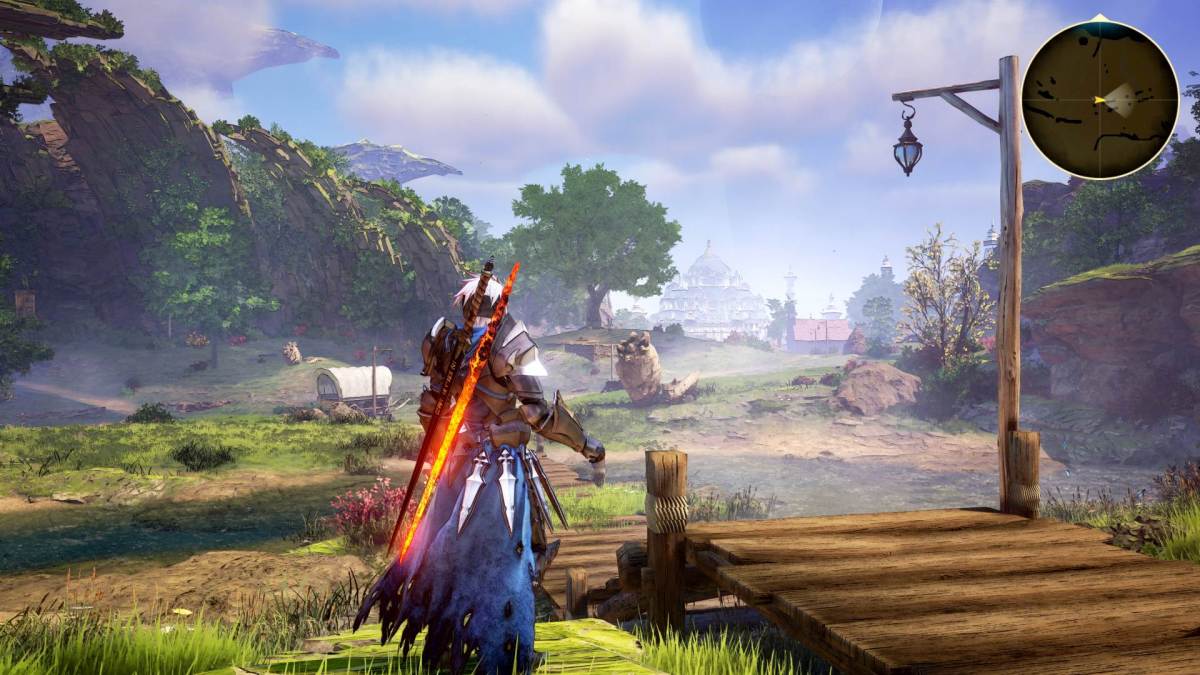Giving the Tales series a little Boost
I’ve been asked a number of times which Tales Of game is the best for a newcomer. For a series that’s been around for such a long time, there’s still a fair number of folks trying to get into it, and that’s no different for Tales of Arise; its big visual overhaul alone has drawn in people who otherwise might look over this new RPG.
Usually I recommend the commonly available standards, like Vesperia or Symphonia, or even the most recent, Berseria. So it’s honestly a good sign that after playing through a demo of Tales of Arise via Parsec, this feels like a good starting point too.
For those just now checking in on this game, Tales of Arise is a standalone story in the same way that Final Fantasy or Dragon Quest games are. It follows its paired leads—Alphen, a partially masked Dahnan man wielding a flaming sword, and Shionne, a Renan woman who wields a rifle and magical artes—as they venture through the world, dealing with the conflict between their home planets. Alphen can take damage in exchange for adding damage to his attacks, while Shionne acts as both long-range support and healer.
Joining them on the party, and playable in this demo, are four more party members. Rinwell and Law are the Dahnan characters; the former is the mage of the group, blasting foes from afar with her artes, while Law is a close-combat fighter. On the Renan side, Kisara wields a massive shield to protect her allies and Dohalim mostly seems to be a primary healer, though with some extra power of his own.
Some aspects of Tales of Arise will feel distinctly different to both longtime Tales Of fans and those who have lapsed in playing over the last few entries. If you haven’t played since the Vesperia days, the biggest change in Arise for you is likely that battles aren’t on the 2D plane within a 3D arena like they used to be; instead, you have a full range of motion within the arena, something the series has been slowly working its way towards for a while with entries like Zestiria and Berseria.

Tales of Arise definitely feels like it’s taking inspiration from the action-oriented direction of modern RPGs. Dodging is very important; not only does it mean avoiding damage, it gives the player a slowed-down moment to get some hits in, and can often leave the enemy’s glowing weak area wide open. Hit that enough and you get a stagger, allowing the party to unleash even more damage.
As I ran around the open field fighting monsters, getting a handle on the new combat, I came to appreciate one feature the most: the Boost Attack and Boost Strike system. Tales of Berseria toyed with tagging in different characters, but Tales of Arise makes it a focal point. Though I was playing as tall, moody hero Alphen, I was able to call on my allies to jump in and help out with their signature Boost Attacks.
In the case of rifle-wielding Shionne, this was a blast that made it easier to deal with airborne enemies. The shieldbearer Kisara could jump in to block a charging enemy, or Dohalim could give me an infusion of healing. (Healing, by the way, is regulated by a pool of Cure Points, used specifically for healing and support artes.)
Boost Attacks are essentially similar to support attacks in a team-versus-team fighting game. They act as quick responses to tough situations, or as combo extenders to make your string of attacks even more devastating. Though it felt a bit odd at first, and maybe a little overwhelming to keep track of, I started to really like what it did for the overall experience of Tales of Arise.
Not only does the combat feel fast and responsive, it makes the party feel like just that: a band of adventurers, fighting together rather than just in the same general area. Tales Of games have had options like Link Artes or the Switch Blast in the past, but Boost Attacks made my party feel both connected and aware of each other in battles. Plus, it feels really good to do a long combo string, call in Law to punch them a bit for me, and then start up the combo again.
It all culminates in Boost Strikes. After filling up a gauge on enemies with constant strikes, artes, and Boost Attacks, you can launch into a Boost Strike: a co-op onslaught where two party members team up for a special strike that can defeat non-boss foes. I saw three in the course of my playtime, and my favorite was definitely Kisara and Dohalim’s; the latter creates a magical blade on the end of Kisara’s shield, and she slashes the enemy with it, doing massive damage.

Just the six of us
Those elements, combined with ambient world dialogue and camping out, create a sense of party unity that I really felt throughout the demo. RPGs frequently run into the question of how to handle a party fighting as a single unit, or interacting among themselves. Tales Of games have always had little asides—skits—to help reinforce the idea that this group jokes among themselves, develops group dynamics over time, frets about the problems they’re facing and generally get to know each other over the course of the adventure. Reflecting that more in battle through Boost Attacks and Strikes feels really, really good.
For the rest of combat, it was familiar Tales Of fare, linking attacks into artes for longer combos. There were usage counters for the artes, a staple of the series, though my ability to map artes was limited to three buttons for ground and three for the air. While you can shift button mappings on the fly in battle, I was missing the artes tree from Berseria a little bit.

Other pieces of the game weren’t really on display for this demo so I couldn’t dive into them, and it was centered on a small task in the party’s journey—taking out a giant monster terrorizing the locals to earn a night indoors and entrance to a city—so I didn’t really get a sense of how the broader narrative plays out. That doesn’t really bug me, though; I’ve played a number of Tales Of games through the years, and what’s kept me coming back to the series time and again is the strength of its cast.
For me, these games are comfort food. Their greatest strength has been in the combat and in the cast, and in this Tales of Arise demo, I got a good slice of both. I’m interested to see how the streamlining of systems pans out over the course of a usual Tales Of game’s runtime, but I’m definitely looking forward to the next time I get to hang out with this group and Boost Strike some monsters. Tales of Arise arrives on Sept. 10, 2021 for PlayStation, Xbox, and PC.













Published: Jun 17, 2021 09:45 am